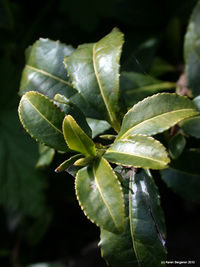Melaleuca alternifolia
| See Also | Botanical Monographs |
|---|
Tea Tree (Melaleuca alternifolia) is best known for its ability to fight infections. It has antiviral, antibacterial, antifungal and antiparasitic properties and is used primarily as an essential oil due to its high cytotoxicity. To explore the characteristics, medicinal uses and prescribing considerations of this herb in more detail, check out the references indicated.[1], [2]
Contents
Characteristics
- Common Names: Tea tree, Ti tree
- Family: Myrtaceae
- Habitat: Melaleuca alternifolia is native to Australia.
- Parts Used: Leaves
- Constituents: volatile oils (terpinen-4-ol, cineol)
- Medicinal Actions: antimicrobial (bacteria, viruses), antifungal, antiparasitic, antiseptic, immunostimulant
Uses
Historical Uses:
Melaleuca alternifolia was used by aboriginal Australians for coughs, colds, and skin infections as infusions or inhaled.
Medicinal Uses:
- infections such as wounds, infected rashes, impetigo, infected seborrheic dermatitis, furuncles, acne, warts, fungi (ringworm, athlete's foot), vaginal yeast infections (suppositories or douche), throat infections, oral thrush (gargle and spit)
- chronic infections including cystitis and postviral fatigue syndrome.
- Tea Tree Oil is effective against bacterial, fungal, viral and protozoa infections.
- Caution with tea tree oil is required as it has a high level of cytotoxicity.
Prescribing Considerations
The information provided is intended to augment the treatment from a naturopathic doctor or other trained medical professional. Although most herbs are generally safe, it is recommended that you avoid self-prescribing especially when there is an underlying ongoing medical condition, if you are on any prescription medications or if you are pregnant or breastfeeding.
Formulations and Preparation
- Infusion - 1/2 tsp per cup of water three times daily
- Oil - may be used topically; dilute in carrier oil if burning of skin occurs (due to cineol- low quality oil has more)
Products should contain 30% or more terpinen-4-ol and less than 15% cineol.
Safety
The safety and prescribing considerations for this herb include:[3] [4]
- Generally regarded as safe.
- Side-effects are potential allergic hypersensitivity may occur with internal use, external use, or inhalation due to the volatile oils; skin irritation.
- Caution should be taken with oral administration.
- Drug-Herb Interactions.[2]
- Aminopyrine - Increased clearance of drug may occur due to induction of hepatic enzymes.
References
- ↑ Boon Heather, Smith Michael (2009) 55 Most Common Medicinal Herbs: The Complete Natural Medicine Guide Second Edition Institute of Naturopathic Education and Research, CCNM Toronto.
- ↑ 2.0 2.1 Godfrey Anthony, Saunders Paul, Barlow Kerry, Gowan Matt (2011) Principles and Practices of Naturopathic Botanical Medicine, Advanced Botanical Medicine. V3 CCNM Press, Toronto.
- ↑ Stargrove Mitchell Bebell, Treasure Jonathan, McKee Dwight L (2008) Herb, Nutrient and Drug Interactions: Clinical Implications and Therapeutic Strategies.
- ↑ Brinker Francis (1997) Herbal Contraindications and Drug Interactions: Plus Herbal Adjuncts With Medicines, 4th Edition Eclectic Medical Publications.
